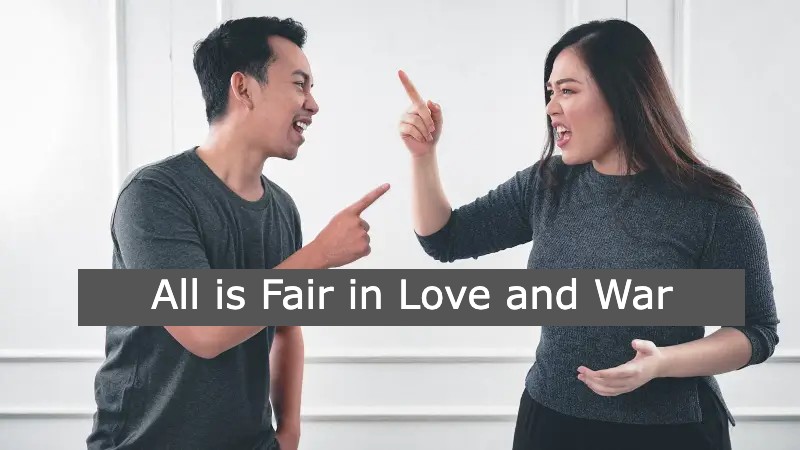The saying “All is fair in love and war” is one that has been used many times and in many ways historically. You’ve probably heard it or read it a few times during your life, but not everyone fully understands its meaning.
All is fair in love and war essentially means “anything goes.” It refers to the fact that in situations of life and death – or desperate love – the rules of fairness go out the window and people will do anything to get what they want.
All is Fair in Love and War Examples
Situations in which people might use this saying to justify their actions include fights, actual war, love triangles, and lying or cheating on their significant other. It is also used in situations that have nothing to do with either love or actual fighting – for example, competition between 2 employees for a better position at a company could be construed as a war.
War and Fighting
In war or in a fight, this expression means that you can take whatever actions you deem necessary for your own survival. Soldiers might use it to justify shooting an enemy soldier in the back or killing civilians, despite the fact that there are rules against such actions.
In a bar fight or a mugging, it could be used to justify grabbing a weapon and hurting your opponent.
Another way of expressing this is, “It was him or me,” meaning that if you didn’t strike first, your opponent would have hurt or killed you. In this case, there is nothing wrong with defending yourself if you see no other way out.
Love
In love, the saying is used to justify behaviors that everyone knows are wrong, such as wooing someone who is in a relationship, cheating on your SO, or trying to force someone you like to be with you, even if they don’t feel the same way (don’t do this!).
It is often explained away by saying that people don’t think straight when they’re in love.
For the most part, the expression is used as an excuse for someone’s actions only after they have been caught doing wrong. I would imagine very few people go into an affair thinking, “Well, all’s fair in love and war, I might as well do what I want.”
Other situations
All is fair in love and war is also used as a metaphor for situations that have nothing to do with either. If someone lies about their colleague to give themselves a better chance at a promotion, their friends and supporters might say, “Well, all’s fair in love and war.”
Is It True?
If you’re wondering whether you can use this expression to justify your actions and get away with bad behavior, the answer is no.
Not if you wish to be a decent person who has integrity and keeps to their word. Using this expression to explain away your bad actions is not only wrong, but it shows weakness of character.
If you want to be the kind of person who is respected and loved for who they are, you should take actions based on doing the right thing, and you should own up to your mistakes when you make them.
Nobody is perfect, and we all do things we regret, but how we behave when we make mistakes is what makes us good or bad people.
If you do something wrong, the best approach is to acknowledge your mistake, apologize, and do your best to set things right, rather than shrugging it off with a cliche and leaving other people’s lives in tatters.
History of All is Fair in Love and War
The expression has been phrased in various ways over the last 5 centuries or so. The earliest recorded version of it was written by a poet named John Lyly in 1578, but it didn’t become the expression we all recognize today until the 1800s, because the English language has changed drastically since the days of Lyly and Shakespeare.
Interestingly, when Lyly wrote his version, there was very little in the way of rules regarding either love or war, and since then, all the rules of engagement that are used to control armies and keep things fair in war have been created. Yet, somehow, the expression persists.
Conclusion
All is fair in love and war is a way of justifying people’s actions when they do something wrong. It means that any action you take in a high-stress situation is justified because the rules of fairness no longer apply. If it’s you or them, you will always choose you.
Using the expression to justify your mistakes and bad actions shows weakness of character, and you should avoid using it. Rather, you should own up to your mistakes and try to do right by those you have hurt.




